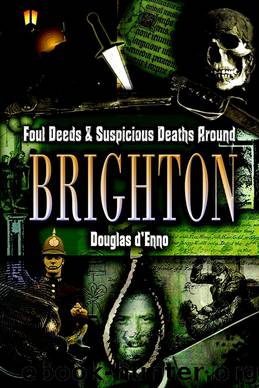Foul Deeds and Suspicious Deaths Around Brighton by Douglas d'Enno

Author:Douglas d'Enno
Language: eng
Format: epub
ISBN: 9781783033782
Publisher: Wharncliffe
Published: 2013-05-21T16:00:00+00:00
The letter to the Coroner was in much the same vein. Beginning, ‘Sir, I am putting some work in your way’, it went on to name the three men Clifford believed his wife was seeing. In a postscript, he wrote:
I have tried to induce my wife to return to me and live happily, but she says her mother has told her not to, but to be by herself. Please remember that the home and everything else is mine, and I leave it all to my mother to bury us both.
Mr Martin gave evidence as to Clifford’s admission and treatment at the Royal Sussex County Hospital. He stated that a bullet could go through certain portions of the brain and not affect a man’s mind at all. While in hospital, Clifford had said he remembered the day he went to Brighton and the day he entered the hospital.
The mothers of the victim and killer respectively were called. Augusta Walton repudiated a number of statements in Clifford’s letters, and stated he professed to be very fond of his wife, but there were quarrels, and he accused her of being unfaithful.
For her part, Mrs Ellen Clifford spoke of her son’s war service. Cross-examined, she said that after his return from South Africa he was very excitable and eccentric and had fits. He had threatened once or twice to throw himself from a window. His right hand was paralysed and he had great pain in a leg. Her daughter-in-law, she claimed, was a bad-tempered woman, who once threw a jug of milk at her husband because he was late coming home.
Susan Hughes, of Copenhagen Street, off Caledonian Road, London, was an important witness. When Maud came out of prison in 1909 after serving a short sentence for prostitution, she went to live with Clifford and Hughes and it soon became clear that Clifford had fallen for her. Inevitably, they later moved out and set up home together.
Hughes recollected seeing Clifford just before Christmas, 1913. He was no longer living with Maud and was very short of money. He seemed very depressed and said he was thinking of finding Maud, shooting her and then killing himself. In January, 1914, Clifford called on Hughes again, this time with a revolver in his possession. Again he said he wanted to shoot Maud and himself. Concerned for his well-being, Hughes allowed him to stay with her for a few weeks. Once he had gone, she found the revolver hidden amongst some linen but the very next day, Clifford returned and asked for it back.
Jacob Carr, a hairdresser and dealer of 28 George Street, Brighton, had known Clifford and his family for twenty years. He knew him by the nickname ‘Oscar’ and they were on good terms, despite him having only seen Clifford three times in the previous eleven years. When Clifford and Maud travelled down to Brighton, they met up with Carr on the Monday night – the night before Maud’s death. He had a few drinks with them in a public house in East Street.
Download
This site does not store any files on its server. We only index and link to content provided by other sites. Please contact the content providers to delete copyright contents if any and email us, we'll remove relevant links or contents immediately.
Mindhunter: Inside the FBI's Elite Serial Crime Unit by John E. Douglas & Mark Olshaker(9318)
Wiseguy by Nicholas Pileggi(5769)
Room 212 by Kate Stewart(5105)
Hitman by Howie Carr(5089)
Secrecy World by Jake Bernstein(4741)
Killers of the Flower Moon: The Osage Murders and the Birth of the FBI by David Grann(4435)
Papillon (English) by Henri Charrière(4262)
Breaking Free by Rachel Jeffs(4216)
Killers of the Flower Moon by David Grann(4037)
Say Nothing by Patrick Radden Keefe(3975)
American Kingpin by Nick Bilton(3875)
The Secret Barrister by The Secret Barrister(3696)
Molly's Game: From Hollywood's Elite to Wall Street's Billionaire Boys Club, My High-Stakes Adventure in the World of Underground Poker by Molly Bloom(3529)
Mysteries by Colin Wilson(3446)
In Cold Blood by Truman Capote(3374)
Signature in the Cell: DNA and the Evidence for Intelligent Design by Stephen C. Meyer(3127)
I'll Be Gone in the Dark by Michelle McNamara(3080)
Rogue Trader by Leeson Nick(3039)
Bunk by Kevin Young(2993)
